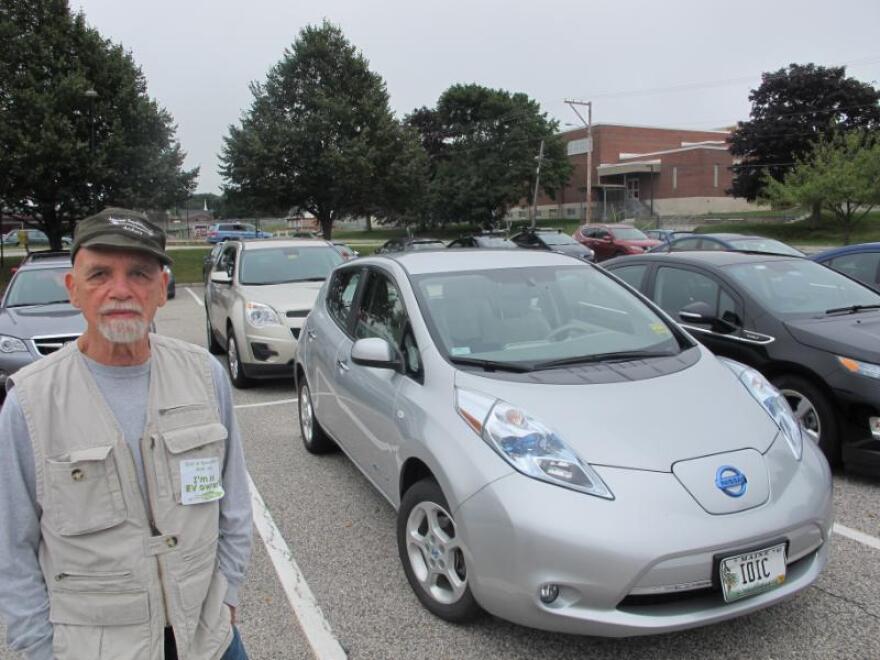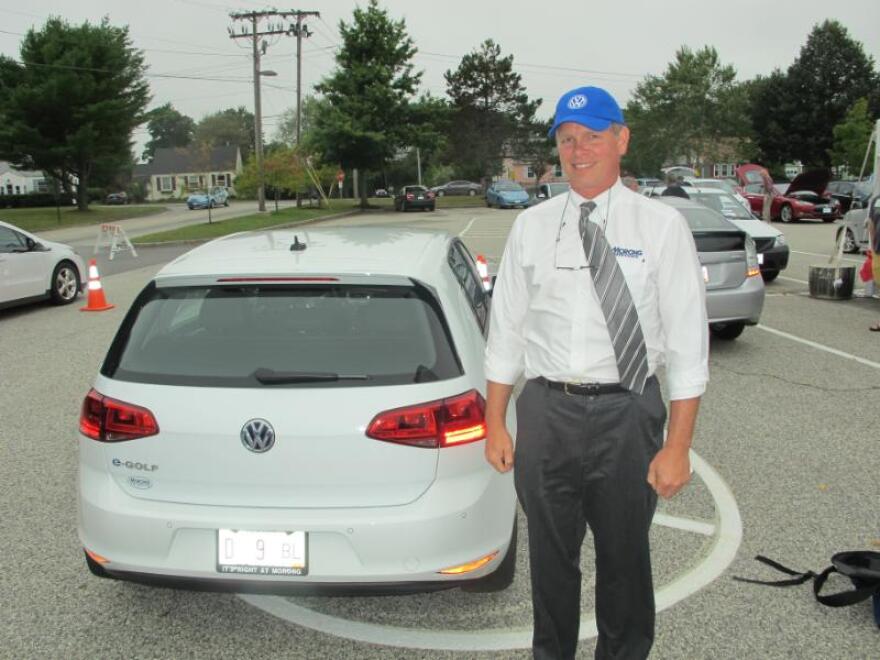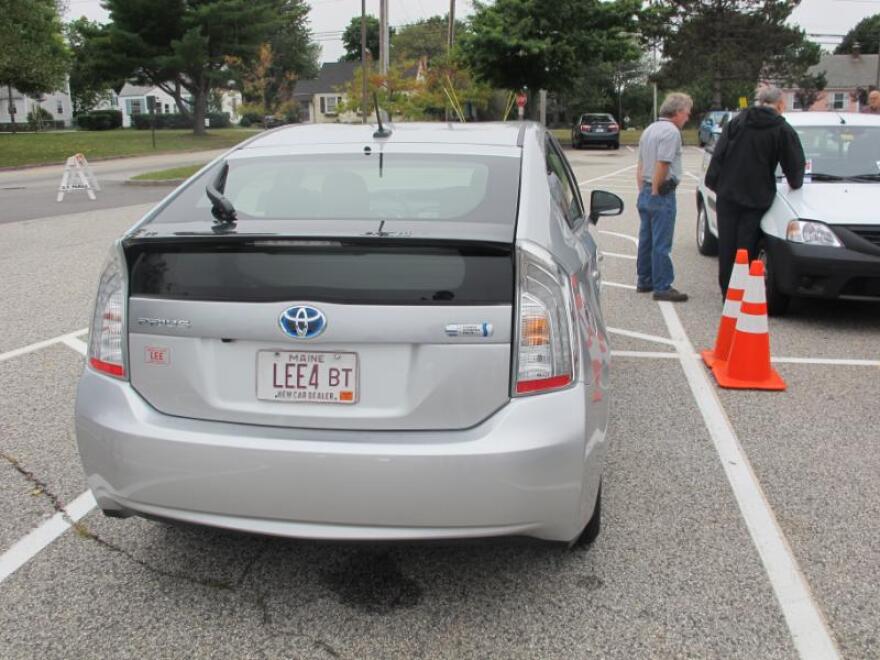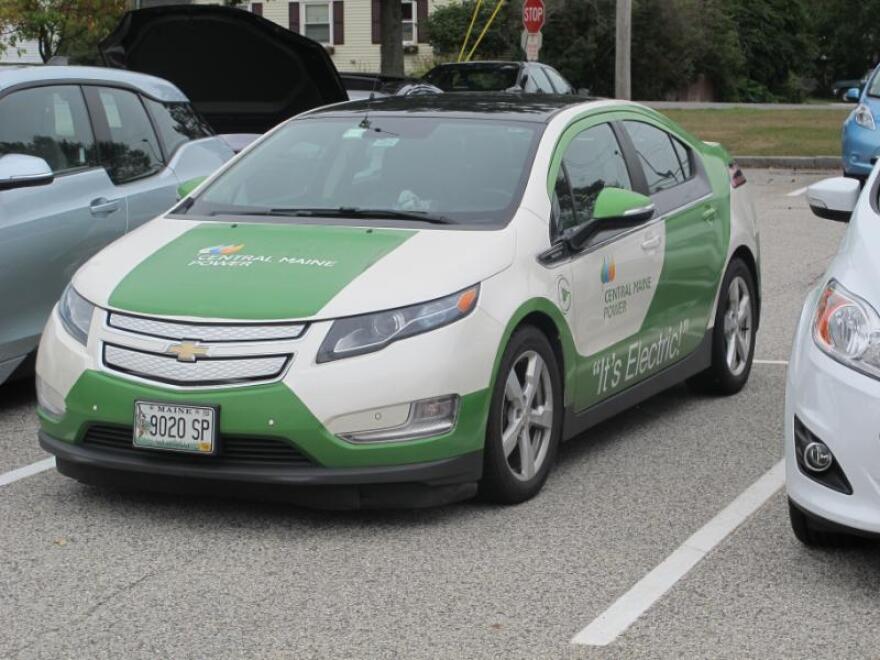PORTLAND, Maine — As car giant Volkswagen reels from revelations that it rigged emissions tests on millions of diesel-powered cars, green power advocates point out that there's one type of automobile whose environmental friendliness is guaranteed.
That is, of course, the electric vehicle, or EV.
EV proponents point to improving technology and declining prices as signs that battery-powered cars could one day be seen in nearly every driveway. But others say electric vehicles are a long way from going mainstream.
The 2015 Volkswagen E-Golf looks like a regular gas-powered car from the outside. But unlike the Volkswagens under scrutiny for their emission problems right now, this car is in the clear. That's because it's battery operated.
When you climb inside you can see the difference.

Salesman John Philips explains the setup of the control panel — but first you have to press the start button, which is activated by a smartkey.
Electric cars can now perform as well as most gasoline powered vehicles. They also produce an artificial, noticeable enginelike sound.
"The purpose of that is for safety, so if you have pedestrians they'll hear the car," Philips says. "When you hit 30 miles an hour that noise goes away."
The E-Golf was one of several electric cars available for a test drive at a promotional event in South Portland to celebrate the rise of the electric vehicle.
Marc Lausier from Scarborough says he was one of the first people in Maine to purchase an electric car.
He's now on his second Nissa Leaf. He says he likes the fact that it is less harmful for the environment. But he also likes that it is less expensive to maintain than a gasoline-powered vehicle, so it has less impact on his wallet.

"These cars operate at an efficiency about four times better than gas-powered cars," Lausier says. "So all depending on your particular driving habit, you're saving a lot of money."
"They've just really come a long way." says Julie Rosenbech of South Portland. "It's really smooth driving, it's really fun driving."
She has just returned from a test drive and is seriously considering purchasing her first electric car.
"I'm totally sold on the technology," Rosenbech says. "In terms of wanting one I'm absolutely in."
Last year more than 300,000 plug-in cars were sold globally, bringing the worldwide market to nearly three quarters of a million.
The U.S. has over 40 percent of that global share.
Here in Maine, a recent survey by the Natural Resources Council of Maine found high satisfaction levels among the state's 600 electric vehicle owners.
For the purposes of the survey, the term "electric vehicle" is used to describe all cars that "plug in," some of which are hybrids, meaning they also have a backup gasoline tank which is used to power the battery when it runs down.

"There's a lot of choices that people have," says Dylan Voorhees, the NRCM's director of clean energy.
He says attitudes towards electric vehicles have become accepting in recent years.
"We're seeing them take off as people realize there's probably an EV out there for you," Voorhees says.
EVs may be "taking off," but they're not soaring. In Maine they represent just over one percent of the cars on the road — nationally, it's less than one percent.
And there are signs are that sales are slowing down.
"I think we're seeing a slowdown compared to the last 3 years, which were year-over-year 100 percent growth," says Barry Woods, director at Electric Mobility NE, a Maine-based electric vehicle consultant.
Part of the reason for the slowdown, he says, is the low price of gasoline.
"That is part of the equation, but I also think two words come to mind when I think of that: India and China, and how many new vehicles they're putting on the road every year — in the millions," Woods says.
But with more public charging stations popping up around Maine, batteries expected to go 200 miles on a single charge in a couple of years, and cheaper replacement batteries on the market, Woods says electric cars are becoming increasingly attractive. One day he expects most families to have one.

"Every iteration of vehicle is improving in some way and more and more people are finding that it fits well with their typical commuting and typical usage," he says.
Woods says the average price of a new EV has come down and is now around $30,000, similar to regular cars.
But this is still too high for the many consumers out there who can't afford a new car, says Jamie Page Deaton, auto editor for U.S. News and World Report.
"With gas prices as they currently are, even if they go up quite a bit, even if they go up another dollar or two, an electric car at their current price still doesn't make economic sense for a lot of people, because over the life of the car they're not going to make up in fuel savings what they're paying extra up front," she says.

She doesn't expect electric vehicles — including conventional hybrids — to occupy more than 10 percent of the U.S. car market for the foreseeable future.
But she says auto makers will continue to invest in EVs even amid slowing demand because they have corporate average fuel economy standards they need to meet. And conscientious consumers do care about their carbon footprint, even if they aren't choosing to go electric just yet.
Beyond 350: Confronting Climate Change is made possible by a grant from the Doree Taylor Charitable Foundation.



